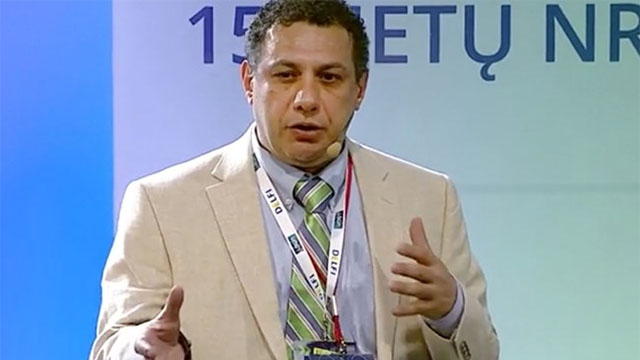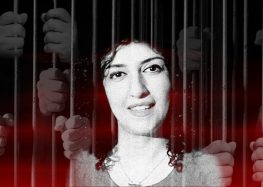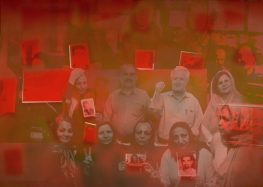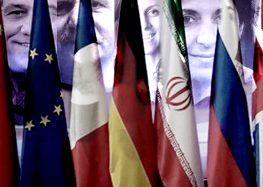Lebanese-American Internet Freedom Advocate Starts Hunger Strike in Iran’s Evin Prison
Nizar Zakka, a Lebanese-born U.S. permanent resident and internet freedom advocate who was sentenced to 10 years in prison in Iran in September 2016 for “espionage,” has been on hunger strike since December 8, 2016 to protest his unjust sentence and the denial of medical and consular services.
“He is innocent and wants to be released,” said his U.S. lawyer, Jason Poblete, in an interview with the International Campaign for Human Rights in Iran, adding that he has been denied access to his client’s case files.
“In the meantime he wants to interact with the International Red Cross or receive some third-party medical attention because he has not been allowed to have visits with anybody,” continued Poblete. “He has not been allowed to have consular services, even though he has asked for them multiple times.”
“He wants to send a message that these things are happening not just to him but also to other Americans, and hopefully it will help highlight the plight of all hostages unlawfully detained in Iran,” he added.
Poblete told the Campaign that Zakka is being held in a ward with political inmates at Evin Prison in Tehran, and has been occasionally allowed to contact his family by phone. “He was a healthy, active individual,” he said, adding that Zakka has suffered considerable weight loss from the hunger strike.
“He has a series of other problems that I can’t get into publicly, but they are serious and that is why he really needs to have an interaction with someone from the International Red Cross or consular service,” continued Poblete.
Poblete also said that repeated requests through his colleague in Tehran to get copies of Zakka’s court documents, including the indictment, had so far been unsuccessful due to a lack of cooperation from the Iranian authorities.
“We know what they are claiming [about engaging in espionage],” he said. “Of course that’s a lie and not true. That’s what the Iranian government says are the charges. But we want to see it in writing.
Based in Washington, D.C., Zakka is an internet and technology expert and founding member of the Arab ICT Organization, a regional alliance of information and communication technology organizations from 14 countries in the Middle East and North Africa.
The internet is heavily restricted and censored in Iran, with hardliners in the government viewing any form of internet freedom as a threat to the sanctity of the Islamic Republic.
He was arrested on September 18, 2015, three days after traveling to Tehran after being invited by Vice President for Women and Family Affairs Shahindokht Mowlaverdi to attend the International Conference & Exhibition on Women in Sustainable Development in Tehran. However, his arrest for being a “Lebanese-American spy” was not reported until two months later.
In September 2016, Zakka was found guilty of “collaboration and espionage for the U.S.” by Branch 15 of the Revolutionary Court presided by Judge Abolqasem Salavati, and was sentenced to 10 years in prison and ordered to pay $4.2 million USD.
Judge Salavati has also presided over many cases against dual nationals, including Amir Hekmati, Saeed Abedini, and Jason Rezaian, who were released in January 2016 in a prisoner swap with the US. He is also the presiding judge in current cases against Iranian-British citizen Nazanin Zaghari-Ratcliffe and Iranian-American business consultant Siamak Namazi and his father Bagher Namazi. In all these cases, the victims have been held without due process and under unclear or unannounced charges, and denied full and proper legal representation.
The Appeals Court is due to convene in January 2017 to review his case, Poblete told the Campaign.
The Revolutionary Guards’ Intelligence Organization first hinted at Zakka’s arrest without any mention of his name in an announcement on November 3, 2015—the day before the anniversary of the 1979 takeover of the American Embassy in Tehran by pro-regime students.
“Several members of an infiltration network working with Western adversary governments (U.S. and U.K.) inside cyberspace and within the media in the country have been arrested,” said the statement. “This action took place after months of constant and comprehensive intelligence gathering around the activities of this network.”
Hours later the semi-official Mehr News Agency quoted “informed sources” saying that one of the arrestees was “Zakka, who has deep ties with the U.S. intelligence and military establishment.”
The next day, the Tasnim News Agency, which is closely affiliated with Iran’s security establishment, claimed Zakka had been exposed in WikiLeaks documents for alleged “contacts with the U.S. embassy in Beirut” and was seeking help from Americans in developing the internet in northern Lebanon.
Shortly after his arrest became public, some hardline news sites also posted photos of Zakka standing next to Vice President Mowlaverdi, an ally of centrist President Hassan Rouhani—who will run for re-election in May 2017—and accused her of having “contact with an American spy.”
Accusing political prisoners of having ties with Western intelligence agencies is a common tactic used by Iran’s security establishment and the Judiciary as justification for national security charges and to rally public opinion against the victims.







